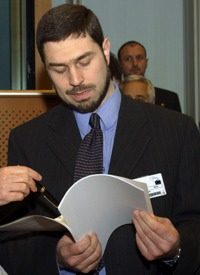
The U.S. Supreme Court on Monday turned down without comment a petition for review from Maher Arar, the Syrian-born Canadian citizen who named former Attorney General John Ashcroft and other U.S. officials as defendants in a suit over his 2002 arrest, detention, and deportation to Syria for interrogation as a terrorist suspect. The Court’s denial of review lets stand a ruling against Arar by the Second Circuit Court of Appeals last November.
Arar, who is both a Syrian and Canadian citizen, was arrested during a stop at New York’s John F. Kennedy Airport on his way to Montreal. He was detained in solitary confinement and interrogated for close to two weeks, then sent by "extraordinary rendition" to Syria where he was imprisoned and tortured over a span of 10 months before his release. U.S. officials were acting on a tip from the Canadian government, which later concluded the information was erroneous. The Canadian government, following a lengthy investigation, awarded him $10.5 million and an official apology. The United States has neither apologized nor offered compensation.
Arar’s suit was first dismissed by the U.S. District Court for the Eastern District of New York in 2006. His appeal was later denied by a three-judge panel of the U.S. Circuit Court of Appeals. The full court later heard the case, however, and ruled against Arar last November by a 7-4 vote. The majority found that since Congress had made no provision for damages suffered under the policy of extraordinary rendition, the court had no authority to find one. The remedy "must be created by Congress, which alone has the institutional competence to set parameters, delineate safe harbors, and specify relief. If Congress chooses to legislate on this subject, then judicial review of such legislation would be available."
The majority further held that "providing a damages remedy against senior officials who implement an extraordinary rendition policy would enmesh the courts ineluctably in an assessment of the validity of the rationale of that policy and its implementation in this particular case, matters that directly affect significant diplomatic and national security concerns."
Judge Guido Calabresi, one of the four dissenters, accused the majority of "utter subservience to the executive branch." Judge Robert Sack, in his dissent, faulted the court for requiring that Arar identify the officials who detained him at JFK, something he was unable to do. Such a requirement, Sack argued, all but invites abuse since it "means government miscreants may avoid liability altogether through the simple expedient of wearing hoods while inflicting injury."
A telecommunications engineer in Ottawa, Arar said he was vacationing with his family in Tunisia in September of 2002, when he was called back to work by his employer. He purchased a return ticket to Montreal with stops in Zurich and New York. When he presented his passport at JFK on September 26, he was identified as the subject of a "lookout" as a "member of a known terrorist organization." He was later informed that he was found "inadmissible" to the United States because of his alleged membership in al-Qaeda.
He was taken to a detention center at the airport and held in solitary confinement while interrogated for eight hours by officials of various government agencies. The following day he was transferred to the Metropolitan Detention Center in New York. He claimed his repeated requests to see a lawyer were refused and it was not until October 1, the sixth day of his detention that he was allowed to make a phone call. He called his mother-in-law in Ottawa, who contacted the Canadian Consulate.
Arar had his only meeting with the lawyer obtained by the consulate on October 5. The attorney was not given advance notice of an interrogation session that took place the following day, when seven Immigration and Naturalization Service officials questioned Arar about why he opposed deportation to Syria. Arar said he feared he would be tortured there.
On October 8, Arar was put on a plane at a New Jersey airfield and flown to Jordan, where he was turned over to Syrian officials. In Syria, he said, he was confined for 10 months in a rat-infested "grave cell," six feet long, three feet wide, and seven feet high. His account of his interrogations includes beatings on his palms, hips, and lower back with a two-inch thick electric cable and punches to his stomach, face, and back of the neck, along with threats of added torments with a spine-breaking chair and electrical shocks. To avoid further torture, he said, he signed false confessions, admitting to training with al-Qaeda in Afghanistan. Arar alleged that U.S. officials colluded with Syria authorities in his interrogation. Many of the questions in Syria were identical to the ones he’d been asked in New York, he said. He also cited a statement by a Syrian official that the Syrians shared information extracted from him with the United States.
Yesterday’s Supreme Court decision means Arar has reached the end of his quest to hold U.S. officials accountable. "It’s a huge disappointment for all of us, really," said Maria LaHood of the New York-based Center for Constitutional Rights. "We’ve been working on the case for six years, for Maher it’s been eight years since it happened, and he’s been seeking justice steadfastly ever since. This is the end of the line for the U.S. courts, unfortunately."
The decision "eliminates my last bit of hope in the judicial system of the United States," Arar said in a written statement. "When it comes to ‘national security’ matters, the judicial system has willingly abandoned its sacred role of ensuring that no one is above the law…. Unless the American people stand up for justice they will soon see their hard-won civil liberties taken away from them as well."



